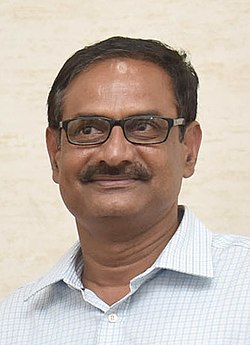P. V. Ramana
| P. V. Ramana | ||||||||||||
|---|---|---|---|---|---|---|---|---|---|---|---|---|
 | ||||||||||||
| Personal information | ||||||||||||
| Full name | Pusarla Venkata Ramana | |||||||||||
| Nationality | Indian | |||||||||||
| Born | Nirmal, Andhra Pradesh, India (now in Telangana) | |||||||||||
| Height | 6 ft 3 in (191 cm) [1] | |||||||||||
Honours
| ||||||||||||
Pusarla Venkata Ramana is a former professional volleyball player from India and an employee of Indian Railways in Secunderabad. He was a member of the India men's national volleyball team and won a bronze medal at the 1986 Asian Games.[2] He was awarded the Arjuna Award in 2000 for his contribution to Indian volleyball.[3]
Ramana was born in Nirmal to a family originally hailing from Eluru that later relocated to Guntur and Nirmal.[4] In an interview with ABN Andhra Jyothi, he shared that his father passed away when he was five years old, and he was raised in Hyderabad alongside his siblings. He completed his graduation, equivalent to a bachelor's degree, in Vijayawada.[5] Ramana and his family regularly visit their family deity in Ratnalammakunta village of Eluru district, Andhra Pradesh.[9]
Family
[edit]Ramana's wife Vijaya has also been a national-level volleyball player. She hails from Vijayawada, Andhra Pradesh.[10] Like him, she is an employee of Indian Railways.[11] Their elder daughter, P. V. Divya, is a doctor[12] by profession and played netball[12] at the national level.
Their younger daughter, P. V. Sindhu, is a badminton player who is a two-time Olympic medallist, having won a silver medal at the 2016 Rio Olympics and a bronze medal at the 2020 Tokyo Olympics, and a World Champion, having won the gold in the 2019 BWF World Championships. Like her father, Sindhu is also an Arjuna Awardee, as well as a recipient of the Khel Ratna, Padma Shri and Padma Bhushan.
References
[edit]- ^ "Jack of all sports, master of volleyball: The story of PV Ramana". Scroll India. 31 August 2018. Retrieved 7 July 2022.
- ^ "Jack of all sports, master of volleyball: The story of PV Ramana".
- ^ Sudhir, T.S. (19 August 2016). "Rio Olympics 2016: PV Sindhu's success stems from efforts of Gopichand and her father". F. Sports. Retrieved 19 August 2016.
- ^ "PV Sindhu's father offers prayers to their family deity in West Godavari". The New Indian Express. 19 August 2016. Archived from the original on 20 August 2016. Retrieved 19 August 2016.
- ^ "Jack of all sports, master of volleyball: The story of PV Ramana".
- ^ "Sindhu performs puja at Ratnalamma temple". The Hans India. Eluru. 26 September 2016. Retrieved 23 July 2023.
- ^ "రాట్నాలమ్మ సన్నిధిలో సింధు". Sakshi (in Telugu). 2 October 2017. Retrieved 23 July 2023.
- ^ "రాట్నాలమ్మ సేవలో సింధు". Andhra Jyothi (in Telugu). 26 March 2021. Retrieved 23 July 2023.
- ^ [6][7][8]
- ^ Pandey, Ashish (20 August 2016). "Who does PV Sindhu belong to? Telangana and Andhra Pradesh in bitter fight". India Today. Retrieved 31 July 2021.
- ^ "Who does PV Sindhu belong to? Telangana and Andhra Pradesh in bitter fight". India Today. 20 August 2016. Retrieved 28 December 2017.
- ^ a b "Divine Coincidences : Why Did P V Sindhu Write So On That Visiting Card". Tirumalesa. 22 August 2016. Archived from the original on 29 December 2017. Retrieved 28 December 2017.
